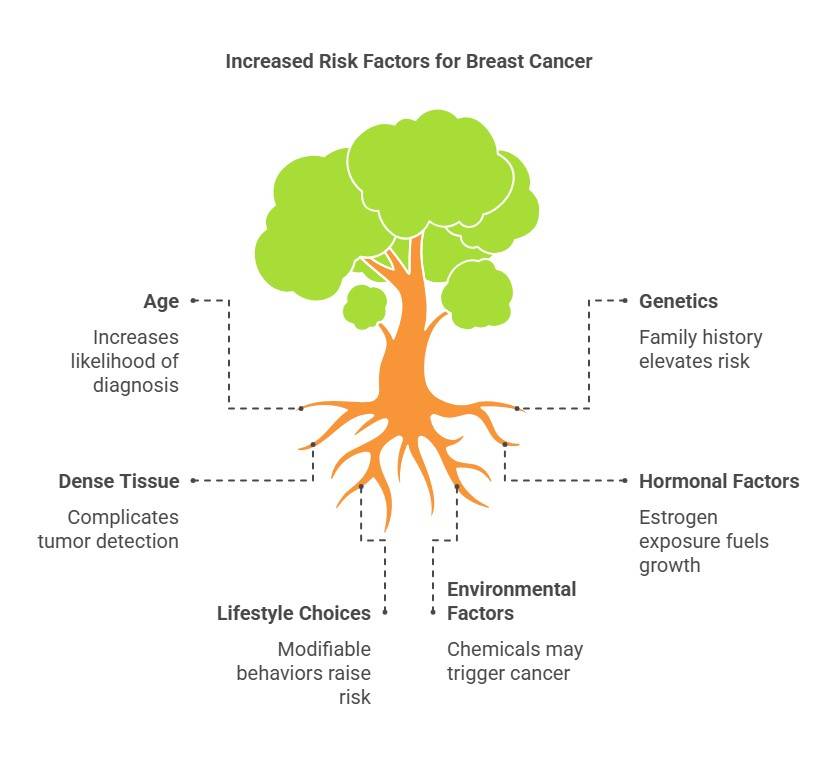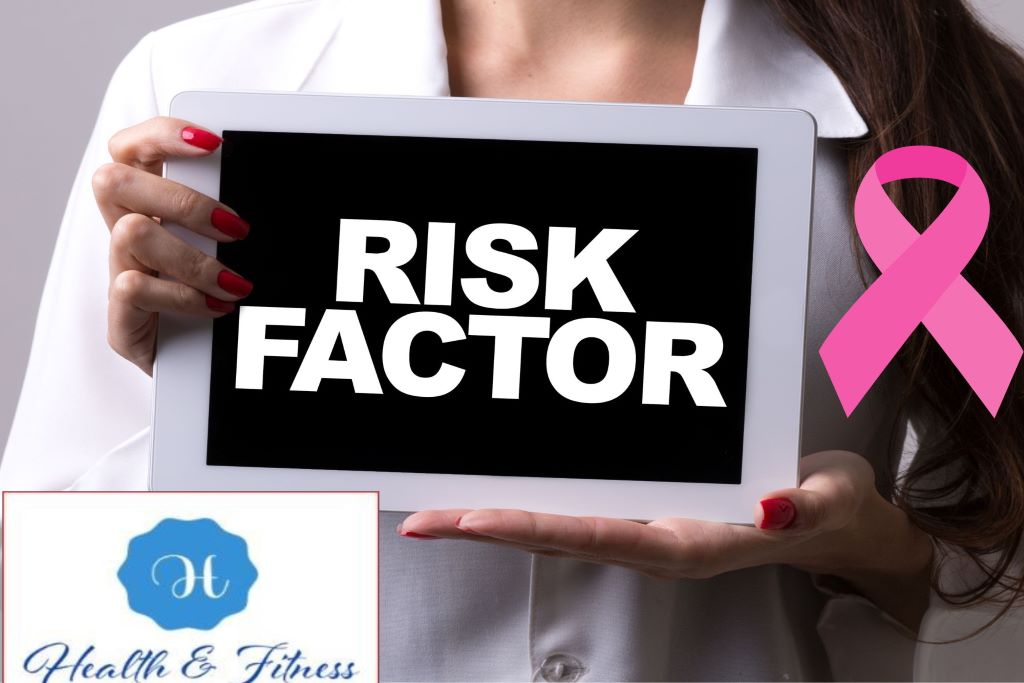Discover the top risk factor for breast cancer and learn how to reduce your risk. Find out what you need to know and how to protect your health. Click to learn more!
One of the most prevalent cancers globally is breast cancer. Understanding the risk factors for breast cancer can help you take steps to protect your health.
In this blog post, we’ll explore the top risks, explain what they mean, and share tips to reduce your chances of developing breast cancer. Let’s dive in!
What Are the Risk Factors for Breast Cancer?

Risk Factor for Breast Cancer is any element that heightens the likelihood of developing the disease.
Certain risks, such as age and genetics, are beyond your control, while others related to lifestyle can be managed. Be mindful of these significant risks:
1. Age
The likelihood of developing breast cancer grows with age, with many cases diagnosed in women over the age of 50.
Why it matters: While younger women can get breast cancer, age is one of the biggest risk factors for breast cancer.
Note: This section is important because age is a key factor that many people overlook. It’s a good reminder to stay vigilant as we age.
2. Family History and Genetics
Your chances of developing breast cancer increase if you have a close female relative—such as your mother, sister, or daughter—who has been diagnosed with the disease.
Specific genetic mutations, such as those in the BRCA1 and BRCA2 genes, also elevate the risk
Why it matters: Genetics play a big role in breast cancer risk.
If your family has a history of the condition, consult your doctor about undergoing genetic testing.
Note: Highlighting genetic mutations like BRCA1 and BRCA2 is crucial because they are significant breast cancer susceptibility factors.
3. Dense Breast Tissue
Women with dense breast tissue face a higher risk of developing breast cancer; additionally, dense tissue complicates the detection of tumours on mammograms.
Why it matters: Regular screenings are crucial for women with dense breasts.
Note: Dense breast tissue is a lesser-known breast cancer vulnerability indicator. It’s important to educate readers about this.
4. Hormonal Factors
- Early menstruation (before age 12)
- Late menopause (after age 55)
- Hormone replacement therapy (HRT)
These factors increase your exposure to estrogen, which can raise breast cancer risk.
Why it matters: Hormones can fuel the growth of some breast cancers.
Note: Hormonal factors are a major breast cancer predisposing factor. This section helps readers understand how hormones impact risk.
5. Lifestyle Choices
- Alcohol consumption: Drinking alcohol increases risk.
- Obesity: Being overweight, especially after menopause, raises risk.
- Physical inactivity: Lack of exercise can contribute to higher risk.
Why it matters: These are modifiable risk factors for breast cancer. Making healthier choices can lower your risk.
Note: Lifestyle choices are something readers can control. This section empowers them to act.
6. Radiation Exposure
If you’ve had radiation therapy to the chest area, especially at a young age, your risk of breast cancer is higher.
Why it matters: Radiation can damage cells, increasing cancer risk over time.
Note: Radiation exposure is a significant breast cancer hazard factor. It’s important for those who’ve undergone treatments.
7. Personal History of Breast Cancer
If you’ve previously been diagnosed with breast cancer in one breast, your chances of developing it in the opposite breast are significantly increased.
Why it matters: Regular follow-ups are essential for early detection.
Note: An individual’s past medical history is a crucial indicator of breast cancer risk. It’s a reminder for survivors to stay proactive.
8. Reproductive History
- Having your first child after the age of 30
- Never having a full-term pregnancy
These factors can increase your risk.
Why it matters: Pregnancy and breastfeeding can reduce breast cancer risk by lowering estrogen levels.
Note: A woman’s reproductive history plays a significant role in influencing breast cancer risk. It’s often overlooked but important to discuss.
9. Race and Ethnicity
Breast cancer occurs more frequently in white women compared to women of other racial backgrounds. However, Black women face a higher likelihood of dying from the disease compared to other groups.
Why it matters: Access to healthcare and early detection play a role in these differences.
Note: Race and ethnicity are important breast cancer exposure factors. This section highlights disparities in healthcare.]
10. Environmental Factors
Exposure to certain chemicals, like those in plastics or pollution, may increase breast cancer risk.
Why it matters: Reducing exposure to harmful chemicals can help lower risk.
Note: Environmental factors are a growing concern. This section addresses modern breast cancer-triggering elements.
How to Reduce Your Risk Factor for Breast Cancer
While you can’t change some factors, there are many steps you can take to lower your risk:
- Maintain Healthy Weight: Focus on a balanced diet rich in vegetables, fruits, and whole grains. This helps reduce Lifestyle Factors and Cancer Risk.
- Build a routine of regular exercise: get at least 30 minutes of movement most days of the week.
- . Reduce alcohol intake: Lowering your consumption can improve your health. Limit yourself to no more than one drink daily for better well-being.
- Don’t Smoke: If you smoke, quitting can improve your overall health and lower your risk.
- Consider breastfeeding: Studies indicate that it can lower the risk of breast cancer. It’s a natural Breast Cancer Prevention Strategy.
- Get Regular Screenings: Mammograms and breast exams help catch cancer early when it’s easier to treat. This is key for Early Detection of Breast Cancer.
Note: Actionable advice is crucial here because it empowers readers to make changes in their lives.
Common Myths About Risk Factor for Breast Cancer
Myth 1: Only Older Women Get Breast Cancer
Fact: While it’s more common in women than 50, younger women can get it too. That’s why early detection is so important.
Myth 2: A Healthy Lifestyle Guarantees You Won’t Get Breast Cancer
Fact: While healthy habits reduce your risk, they don’t eliminate it. Genetics and various other factors continue to influence.
Myth 3: Men Can’t Get Breast Cancer
Fact: Though rare, men can also develop breast cancer. They should also watch for signs and consult a doctor if needed.
Note: Busting myths help clarify misunderstandings and make the article more relatable.
FAQs About Risk Factors for Breast Cancer
What is the most significant risk factor for breast cancer?
Age is the most significant risk factor for breast cancer, with most cases being diagnosed in women aged 50 and older.
What are the 5 common risk factors for cancer?
Five common risk factors for breast cancer include:
- Age
- Family history
- Dense breast tissue
- Hormonal factors
- Lifestyle choices (e.g., alcohol, obesity)
What is the greatest known factor for breast cancer?
One of the most significant known risk factors for breast cancer is simply being female. Breast cancer, while possible in men, is significantly more prevalent among women.
Who has the risk of breast cancer?
Anyone can develop breast cancer, but women are at higher risk. Other high-risk groups include those with a family history, genetic mutations, or certain lifestyle factors.
Final Thoughts
Recognizing the Risk Factor for Breast Cancer is the initial step towards preventing it. While some risks, like age and genetics, cannot be changed, others, like lifestyle choices, can be managed. Making smart, health-conscious decisions can reduce your risk and enhance your well-being.
Remember, early detection saves lives. If you’re worried about your risk, consult your doctor to discuss screening possibilities.
Read also about
How I Knew I Had Inflammatory Breast Cancer: A Journey of Awareness and Action
Breast cancer diagnosis and treatment with COVID-19

Adel Galal is a health and wellness writer with over 30 years of experience studying and writing about health, fitness, nutrition, and healthy living. He is the founder of NextFitLife.com, where he shares practical, evidence-based guidance to support long-term health at any age. Adel’s mission is simple:
to help people make smarter health choices that fit real life, at any age.



